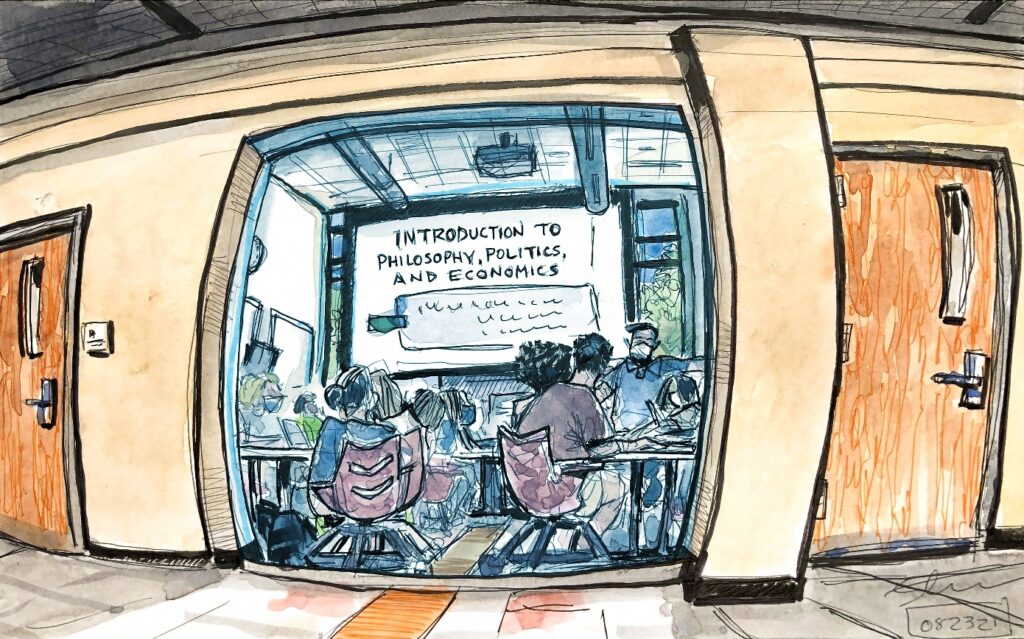A. PPE COURSES
In addition to my regular courses in moral, political, and social philosophy (see below), I have taught and/or developed the following interdisciplinary courses that systematically integrate the fields of philosophy, political science, and economics.
PPE 1004: Introduction to Philosophy, Politics, and Economics
This course discusses classic and contemporary readings in philosophy, politics, and economics with historical and current relevance. Core concepts and topics span the history of moral, political, and economic thought; political economy; equality and fairness; socioeconomic status, power, class, diversity; and the evolution of the human condition.
This course trains students to look beyond the boundaries of academic disciplines by offering an integrated study of philosophy, politics, and economics. The course enhances students’ understanding of each discipline, its methods, and implications. It trains students to make decisions that are not only economically sound, but also socially, ethically, and politically informed.

PPE 3884: Topics in Philosophy, Politics, and Economics
This course discusses important topics and thinkers in philosophy, politics, and economics with historical and practical relevance. The focus of this course lies on interdisciplinary analysis and methods. Topics vary but include: the limits of markets; well-being theory, science, and policy; socioeconomic justice; economic and political institutions; and global poverty.

This course addresses advanced topics at the intersection of philosophy, politics, and economics, such as economic rationality, utility theory, game theory, social choice theory, political economy, markets, justice, and democracy. The course allows senior students to synthesize their knowledge gained during their PPE studies and apply it to an interdisciplinary research topic of their choice.

PPE 4964: Internship Course
This course allows students to receive credit for internships, field studies, and practicums in the context of their PPE studies. Through participation in such experiential learning opportunities in administrative, research, industry, or government settings, students apply and transfer theoretical knowledge from the classroom through hands-on experience.
B. UNDERGRADUATE TEACHING
Introduction to Philosophy (100 level)
Morality and Justice (100 level)
Global Justice (200 level)
PPE Gateway Course (200 level)
Political Philosophy (300 level)
Contemporary Theories of Justice (400 level)
PPE Capstone Course (400 level)
Undergraduate Research (400 level)
C. GRADUATE TEACHING AND SUPERVISION
Normative Ethics (500 level)
Independent Study (500 level)
The Welfare State (600 level)
Distributive Justice (600 level)
Philosophy, Politics, and Economics (600 level)
M.A. Thesis Supervision (Moral and Political Philosophy)
Ph.D. Dissertation Supervision (Moral and Political Philosophy)
D. (INTER)NATIONAL GUEST LECTURES AND SEMINARS
Philosophy, Politics, and Economics: Part 2 (Undergraduate Seminar), Heinrich Heine University Düsseldorf, Germany (Upcoming)
Topics in Philosophy, Politics, and Economics (Graduate Seminar), University of Graz, Austria (Upcoming)
Philosophy, Politics, and Economics: Part 1 (Undergraduate Seminar), Heinrich Heine University Düsseldorf, Germany
Hobbes and Game Theory (Undergraduate Seminar), Cornell University, U.S.
Economics and Ethics (Graduate Seminar), University of Zurich, Switzerland
Perspectives on Democracy in Philosophy and Economics (Graduate Seminar), University of Hamburg, Germany
Distributive Justice – Local and Global (Graduate Seminar), University of Hamburg, Germany
Philosophy, Politics, and Economics (Graduate Seminar), University of Graz, Austria

